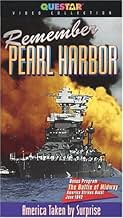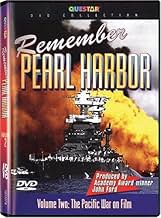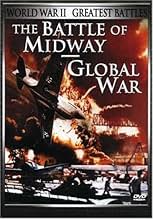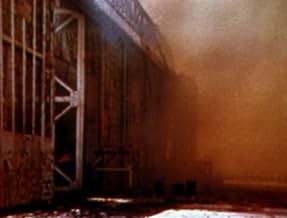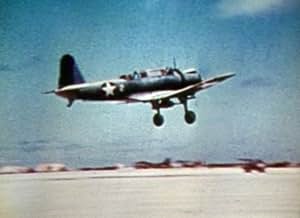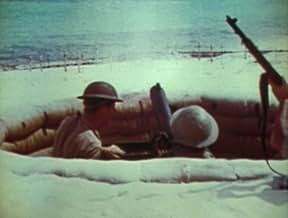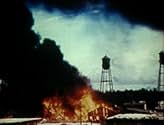NOTE IMDb
6,1/10
2,4 k
MA NOTE
Ajouter une intrigue dans votre langueThe Japanese attack on Midway in June 1942, filmed as it happened.The Japanese attack on Midway in June 1942, filmed as it happened.The Japanese attack on Midway in June 1942, filmed as it happened.
- Réalisation
- Scénario
- Casting principal
- Récompensé par 1 Oscar
- 1 victoire au total
Henry Fonda
- Narrator
- (voix)
Jane Darwell
- Narrator
- (voix)
James Roosevelt
- Self - US Army Major
- (as Major Roosevelt)
Donald Crisp
- Main Narrator
- (voix)
- (non crédité)
Irving Pichel
- Narrator
- (voix)
- (non crédité)
Jimmie Thach
- Self - Naval Aviator
- (non crédité)
Avis à la une
This Oscar-winning documentary – by one of the most revered American film-makers who would have celebrated his birthday on the day I watched this – is quite celebrated, having even been treated to a 2-page spread in the early 1980s British periodical "The Movies". However, the passage of time has not been at all kind to it: not only, at just 18 minutes, does it not dwell in sufficient detail on the famous conflict that purportedly changed the course of the Pacific War
but the whole is lent the director's typically homespun – read sappy – approach, which really dates it! The film obviously retains historical value for its rare colour footage of the battle (some of which was actually incorporated in the star-studded 1976 Hollywood rendition of these same events, MIDWAY!) and, for the record, Ford regulars Henry Fonda and Jane Darwell supply the intermittent narration.
A documentary short, directed by John Ford. Covers the Battle of Midway, one of the most decisive battles of WW2. Taking place near the island of Midway in the central Pacific in June 1942, the battle turned the tide of the Pacific Theatre. Ford uses actual footage from the battle and the aftermath, with narration by Henry Fonda.
During WW2 the US used its mighty film industry to its advantage, producing high-quality news reels. documentaries and propaganda films. For this they enlisted some of the foremost directors of the age: Frank Capra, William Wyler, John Huston, John Sturges and John Ford, among others. Here, John Ford (or should I say, Lt. Commander John Ford, USNR) does his bit.
He does fairly well, capturing some great footage of the battle. It is more the editing and over-the-top, hammy added-on dialogue that weaken the film, and only when viewed with a 21st century lens. Propaganda films never have the same impact when viewed outside of wartime.
The movie went on to win the Best Documentary Oscar in 1943.
During WW2 the US used its mighty film industry to its advantage, producing high-quality news reels. documentaries and propaganda films. For this they enlisted some of the foremost directors of the age: Frank Capra, William Wyler, John Huston, John Sturges and John Ford, among others. Here, John Ford (or should I say, Lt. Commander John Ford, USNR) does his bit.
He does fairly well, capturing some great footage of the battle. It is more the editing and over-the-top, hammy added-on dialogue that weaken the film, and only when viewed with a 21st century lens. Propaganda films never have the same impact when viewed outside of wartime.
The movie went on to win the Best Documentary Oscar in 1943.
Battle of Midway, The (1942)
*** (out of 4)
Henry Fonda and Donald Crisp add narration to the battle scenes shot by John Ford where the director was even wounded by enemy fire. There's really no story being told in this documentary but instead we just see a part of history in beautiful Technicolor. God knows everyone has seen countless war films but there's something unique seeing real ones here. They certainly look a lot different than what we've seen in countless fake movies.
Ford's World War 2 shorts are out there in various forms ranging from public domain companies to the Ford at Fox set. Quality various but the version in the Fox set is the best.
*** (out of 4)
Henry Fonda and Donald Crisp add narration to the battle scenes shot by John Ford where the director was even wounded by enemy fire. There's really no story being told in this documentary but instead we just see a part of history in beautiful Technicolor. God knows everyone has seen countless war films but there's something unique seeing real ones here. They certainly look a lot different than what we've seen in countless fake movies.
Ford's World War 2 shorts are out there in various forms ranging from public domain companies to the Ford at Fox set. Quality various but the version in the Fox set is the best.
10llltdesq
This incredible compilation of footage won an Academy Award. It was shot by a crew of war cameramen that included John Ford, who I understand actually took some of the footage himself! While watching this, remember that you generally can effectively aim either a camera or a weapon at any one time, but not both and, as a cameraman has his eye to the lense while shooting, that means that he's exposed to all of the nasty stuff flying all around him with little or no cover! That's called "grace under pressure". They got an Oscar and deserved a medal! Highly recommended.
There have been many battles in the Second World War that played a part in deciding who the victors of the conflict were going to be, and one of these engagements is known as the Battle of Midway. Like any good ww2 film, this short combines good narration with impressive archive footage that was taken while the battle was ongoing. If that weren't enough, John Ford, one of the greatest geniuses in cinema history, directed this. The film starts with the narrator, Donald Crisp, telling the audience where Midway Island is located and why it holds such significance to the United States military. The film then goes on to show footage of the event that has often been cited as one of the most successful military engagements ever. At Midway, Japanese forces took 20 times the amount of casualties the Americans did, and american carrier aircraft managed to sink all 4 of the aircraft carriers responsible for attacking Pearl Harbor half a year earlier. This all took place only in June 1942, but even just 6 months into America's involvement in the war, they dealt a blow to japan from which they never really recovered. The footage of this event that Ford captured is remarkable because he was so close to the action. Many marines and other servicemen were killed on the island as japanese planes attacked from every conceivable angle, but Ford kept filming. You can see proof of this at one part where the camera gets knocked over by some kind of explosion. Aside from the exciting footage of combat and naval warfare, there isn't too much else to this short. It deserves praise because John Ford risked dying in action in order to record most of it, but at the same time, it's been eclipsed by a lot of other world war 2 related films that also showcase footage of this battle. What makes this one stand out after so many decades is the fact that its director was actually there in the midst of it, something that no modern documentary can boast. Because of this (and the huge interest I have in ww2 things) I have to consider Battle of Midway as one of the most iconic and well made second world war films. It goes without saying that this won an Oscar as well.
Le saviez-vous
- AnecdotesDirector John Ford and cinematographer Joseph H. August were wounded by enemy fire while filming the battle.
- Citations
Main Narrator: Midway Island. Not much land right enough, but it's our outpost. Your front yard.
- ConnexionsEdited into Ils ont filmé la guerre en couleur (2000)
- Bandes originalesAmerica, My Country Tis of Thee
(1832) (uncredited)
Music by Lowell Mason, based on the Music by Henry Carey from "God Save the King" (1744)
Words by Samuel F. Smith
Played in the score and later sung by an offscreen chorus
Meilleurs choix
Connectez-vous pour évaluer et suivre la liste de favoris afin de recevoir des recommandations personnalisées
Détails
- Durée18 minutes
- Mixage
- Rapport de forme
- 1.37 : 1
Contribuer à cette page
Suggérer une modification ou ajouter du contenu manquant


